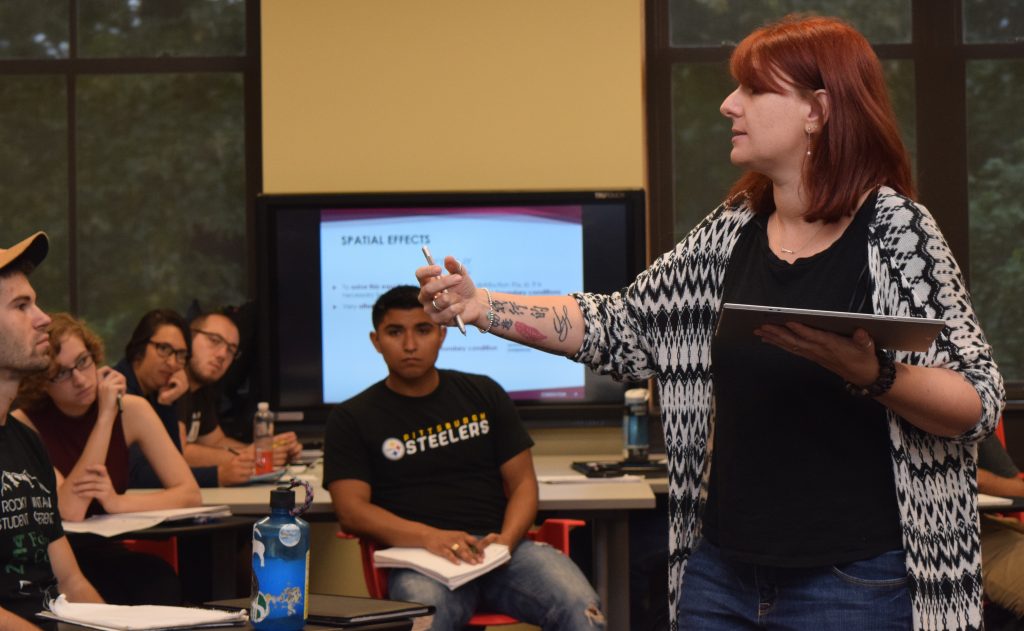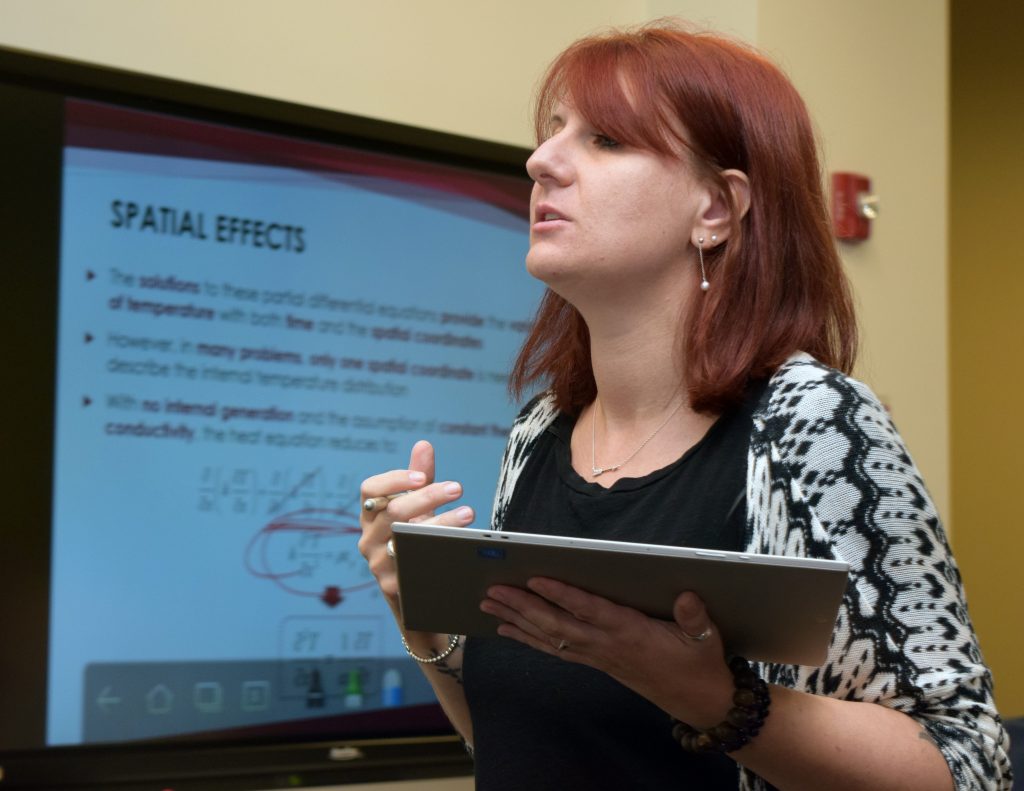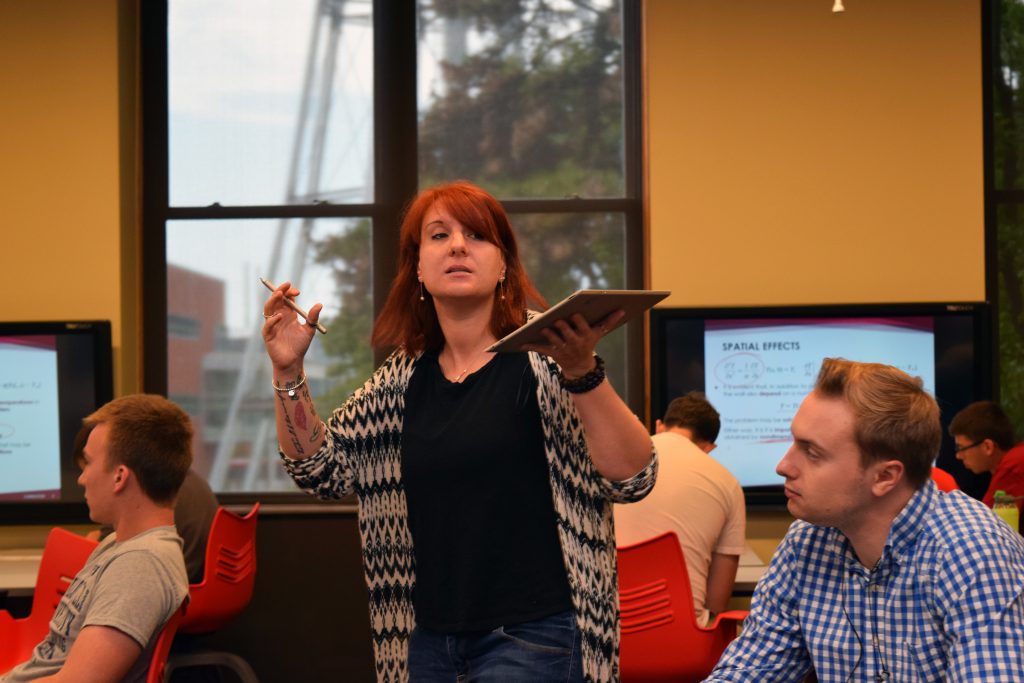
As a young student in her home country of Italy, Paola Pittoni remembers it was strong teachers that had the greatest impact on her. Now as a mechanical engineering lecturer herself, Pittoni hopes that she can leave just as lasting an impact on her students. “The reason I wanted to be a lecturer is because teachers really help to positively shape students and students often remember their good teachers. Good teachers can truly affect their students,” she said. “I don’t mean to diminish my research in any way because I still enjoy research but at the end of the day if I can have an impact on the world, I feel that I can have a bigger impact on the students I teach than I can with the best research paper I could write.” Not only does Pittoni enjoy teaching more than researching, she also prefers working with underclassmen as well as their more senior classmates. “I love to teach freshmen because it’s one of the most impressionable years,” she said. “Some of them come in not really knowing what mechanical engineering is and that’s why I love to teach ME 160 [Mechanical Engineering Problem Solving with Computer Applications].” Another part of Pittoni’s teaching emphasis is to redefine the preconceived notions that students may have about mechanical engineering coming into the program. At the start of the semester, Pittoni has an exercise in which she presents a picture to students and asks them to identify the mechanical components. When shown a picture of a car students are quick to identify the transmission and other engine parts but when presented a picture of vegetables, students struggled more to relate it to mechanical engineering.

Pittoni encourages her students to think critically about all the seemingly invisible roles that mechanical engineering plays with the vegetable example. She points out that mechanical engineering goes into the planting and cultivation of the vegetable, combines and other mechanical equipment are used to harvest the vegetable, vehicles transport the vegetable from the farm to the grocery store, and refrigerators preserve the vegetable until it’s ready to be eaten. Pittoni said she knows that she’s having an impact on her students because of the emails some send her after taking her classes. She said she’s received notes from many different students, from those who have specifically cited her course as helping to prepare them for an internship to those who said they thoroughly enjoyed her class despite not performing as well as they would have liked. Pittoni has begun printing off notes and other quotes from her students to decorate a bulletin board she has in her office. For Pittoni, not only have good teachers played a substantial role in her personal and professional development but her experience studying in different parts of the world has also been important. Pittoni grew up in Milan, Italy and earned her BS in energy engineering from Politecnico di Milano. She also holds a PhD in chemical engineering from National Taiwan University of Science and Technology in Taipei. She said beyond the obvious academic impact, these experiences helped to give her cultural perspective that she would recommend to any of her students. “I would suggest to everyone, especially undergrads, if they have the chance to go to another country to discover and learn, do it,” she said. “They will discover that what they’re used to is maybe not the only way.” Pittoni said she thinks almost all study aboard opportunities can be invaluable and remembered encouraging one of her former mechanical engineering students to study aboard with a program offered outside of the department.

Growing up in Italy, Pittoni said there was more of a bias against women pursuing engineering careers. She pointed out that while some Italian terms have both feminine and masculine forms, the term engineer (ingegnere) only has a masculine form. She also recalled being one of about a dozen women in her undergraduate engineering courses, a fraction of the nearly 400 men in the same courses. Pittoni has channeled her passion for women in engineering by becoming involved with the Women in Mechanical Engineering (WiME) student group on campus. She said she hopes to help continue to grow the group into a strong support network and also offer more outreach that encourages young women to pursue careers in mechanical engineering. “The reason I wanted to participate in this group is because I think generally speaking, young women are not exposed to what mechanical engineering is about,” she said. “I still think that in certain parts of the world and even in the United States there is a bias about girls and women in mechanical engineering. I think this will change in the future I would love to help be part of that change.”